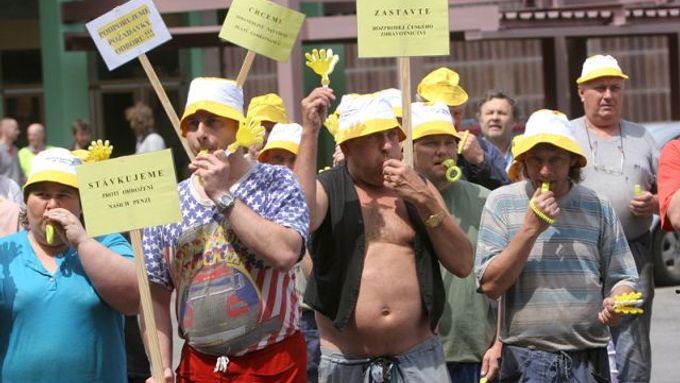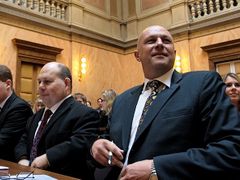Analysis - Today, the Czech Republic has been witnessing a strike the scope of which is expected to be the largest since the general strike held in 1989.
"If the people were better off, no strike would have been held," explains Martin Fassman, an economist of the Czech-Moravian Confederation of Trade Unions (ČMKOS).
Read more: General strike against healthcare reform - June 24
"The government of Mirek Topolánek [Civic Democrats] has raised negative feelings among people that we will be soon even worse," adds Fassman.
However, economic data do not confirm such a pessimistic development. In 2007, the consumption was the highest in Czech modern economy history.
In other words, Czechs are living in the most prosperous era of their history, while they have gone on strike in order to be even better off that they are.
Read more: Poverty declining: the new Czech law is a success
Expecting bad times
The Czech Statistical Office shows that Czechs, out of fear of liberal reforms, have changed their economic behavior in the past few years.
They deliberately do not increase their consumption and they don't take loans that much any more. Also, investments to real estates declined by one third. People are saving because they expect bad times.
Seniors, state employees and lower-class families
There are only three social groups that have a real reason for being discontent and worried: state employees, pensioners and families with children that earn no more than the double minimal wage is.
The statistics indicate that these groups' earnings grew by no more than three percent, while inflation grew by seven percent.
Despite some positive trends such as decreasing number of the unemployed, the situation of poor families is still alarming. It is the poorest that continue to fall in debts.
Seniors forced to cut their costs
Czech pensioners feel they have a good reason to complain, too, as they have been forced to reduce their transport and energy costs.
On top of that, the introduction of medical fees forced the senior citizens to have spent more on health care than ever before.
Read more: Czech medical care fees toughest in Europe
Nonetheless, Czech pensioners are now better off than for example in 2006. In the course of two years prices have gone up by 10 percent while pensioners´ salaries increased by 14 percent.
Teachers and medics quitting their jobs
Teachers, medics and state employees are unhappy about their own situation as well. The medics have launched their strike as first and since morning only emergency services have been provided.
The salary growth rate in the medical health sector is hopelessly under the current inflation rate. In fact, they are in a similar position as they happened to be two years ago.
Read more: Teachers strike today for higher salaries
As a result, four thousand teachers and one thousand medics have left their work by now and found a more paying job.
The number of new state employees has decreased too.
Trade Unions´ economist Fassman claims that the situation is worse for majority of the Czech population.
"Shallow reforms"
Economist Daniel Münich from the liberal Center for Economic Research and Graduate Education - Economics Institute (CERGE-EI) has a different view, though.
"The economic effect of reforms cannot be a reason for a strike. They [the reforms] are so shallow that, for example, social security benefits are the same as they were two years ago," Münich explains.
Münich admitted though such a reform may have an unpleasant effect on the poor. However, he believes major changes in the way state resources are used are necessary.
Minor reforms would not bring anything else but more pain in the future.

